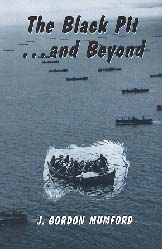|
________________
CM . . . .
Volume VII Number 12 . . . . February 16, 2001
excerpt: "The back of my neck prickles in horror, and my hands grip the ship's rail as I drop instinctively into a crouch. The night erupts in a blinding flash which lights the sky towards the starboard rear of the convoy. A heavy explosion rocks the Scottish Heather; an instant later the ship's klaxon sounds shrilly. Christ, they're attacking again! It's about ten past four, barely ten minutes since I came off watch.The Black Pit is one of the most engaging and well-written "personal accounts" of Canadians at war that I have encountered for some time. The story, which from beginning to end reads more like an adventure novel than an autobiography, recounts the author's service as an English-born, now Canadian, radio officer (carrying the standard sea-faring nickname of "Sparks") in the Merchant Marine. The Merchant Marine, outside the regular armed forces, but facing dangers and losses just as great, was until fairly recently an unfairly ignored element of the war effort. This book will serve to highlight something of the real significance of the Merchant Marine's role, and it will bring its members to life as an immensely interesting array of characters, none individually significant as defined by history books, but, under the author's pen, very real as human beings. In some ways, that kind of portrait provides the most effective way of understanding the meaning of war; and someone in the age group to which the author and his war-time companions then belonged cannot help but emerge with a richer insight into the meaning and impact of the experience. Those who, themselves, lived through those years and experiences will find this book a reassuring reminder of what was good in a evil situation, thanks to the enduring qualities of decent people. War is not romanticized, but one is left with faith in human beings. As an adventure story, the book leaves few waters unexplored. It begins in 1942, with the author's being torpedoed in the North Atlantic (in the so-called "Black Pit," that portion of the Atlantic that was beyond the reach of protective air cover, and in which the convoys were on their own against the U-boat "wolf packs"). Surviving that, the author went on toservice in the Mediterranean/North African campaign, and then into the invasion of Sicily and Italy, this time facing the constant dangers of air attacks. Even later, he saw service in the North Sea, plying between Britain and Holland. There, the danger lay in mines, to which his ship once again succumbed. With victory in Europe, the book ends with the author's setting off for his fourth and final theatre of war, the Far East. In all of this, we have not just the intensity of the moment of conflict and danger, but also the more typical day-to-day details of life aboard a ship at war. Tortuous seas and life-threatening attacks play a large role in the story; but significant time is given to the pure adventures of travel: in Gibraltar, Spain, North Africa, and Italy, as well as visits to wartime London. All of this is part of an accelerated coming of age, with a premature and often confusing introduction to drink, prostitution and personal nastiness. The story is also one of a young man's coming to terms with the difficulties of his past: of the sudden death of his father, and haunting memories of physical, psychological and sexual abuse in a religious school. We see him struggling with his first love affairs, and with his difficulties in pulling away from a mother's domination, while, at the same time, maintaining the family relationships he still needs. Some of this tumult is rather graphically (but never offensively) portrayed, and the author does offer a faithful rendition of the nautical vocabulary: a filmed version would no doubt carry a language warning. But it is an honest story of an ordinary adolescent-man in a test that few of the same age today could even imagine. It is a fascinating personal account; but one that also provides an excellent insight into what war actually means for the ordinary participant. Highly Recommended. Alexander D. Gregor teaches the history of education at the University of Manitoba.
To comment on this title or this review, send mail to cm@umanitoba.ca.
Copyright © the Manitoba Library Association.
Reproduction for personal use is permitted only if this copyright notice
is maintained. Any other reproduction is prohibited without
permission.
Published by
TABLE OF CONTENTS FOR THIS ISSUE - February 16, 2001.
AUTHORS |
TITLES |
MEDIA REVIEWS |
PROFILES |
BACK ISSUES |
SEARCH |
ORDER |
CMARCHIVE |
HOME
|
